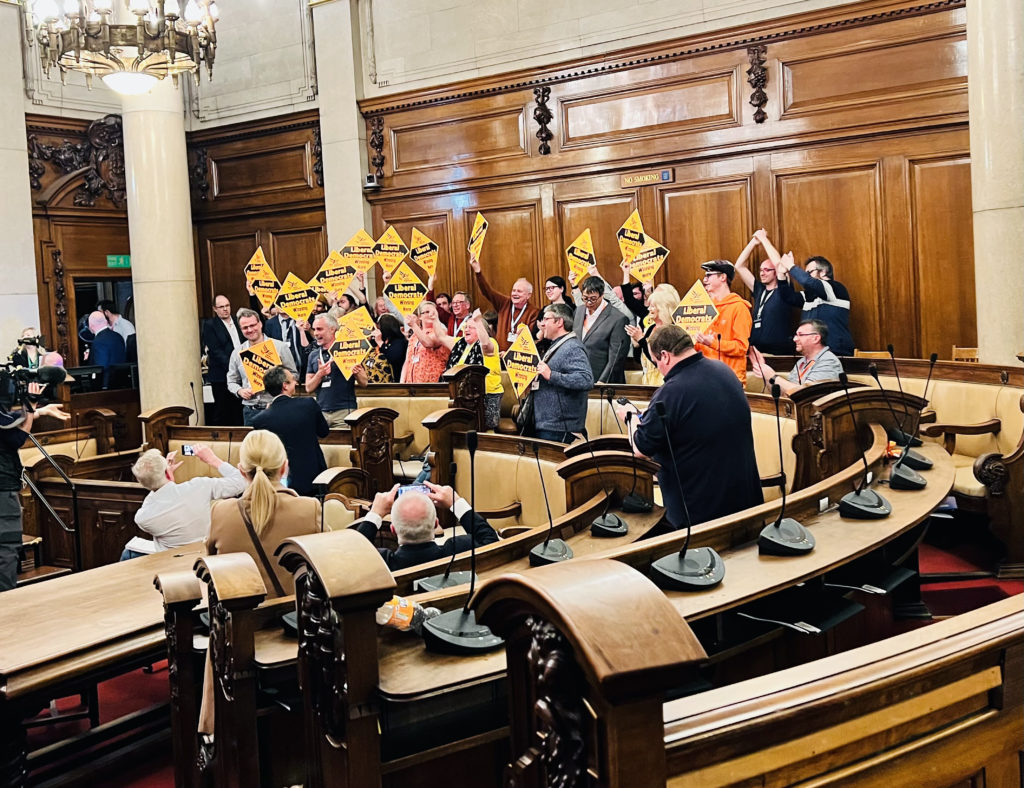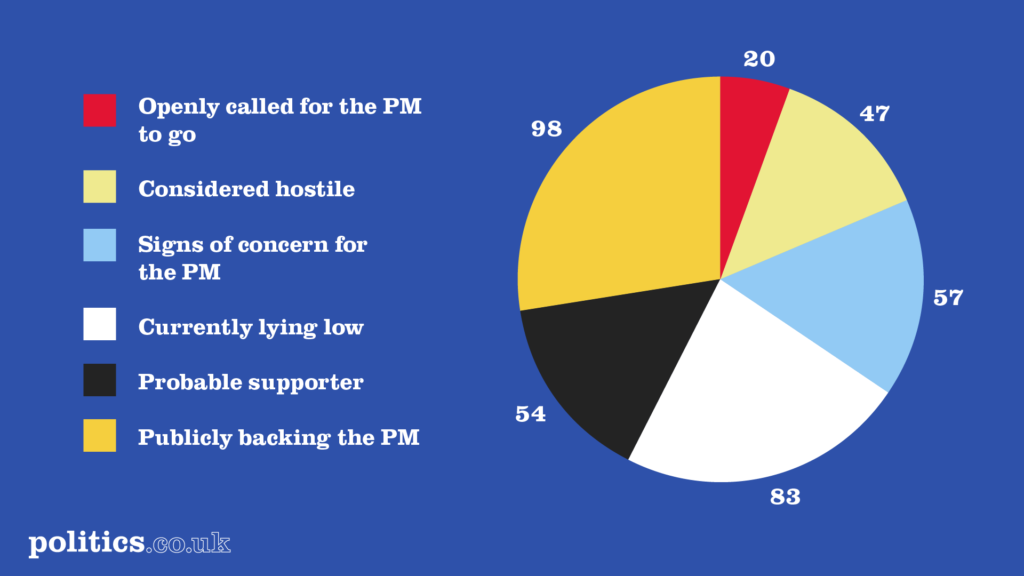Welsh Independence, occasionally referred to as ‘Wexit’, has been at the margins of Welsh politics since the formation of Plaid Cymru in 1925.
However in light of the increasing support for Scottish independence, campaigners for Welsh independence have been gained renewed confidence in recent years.
Support for Welsh Independence appeared to have grown during the 2020/21 Covid pandemic, one which saw an increasingly public role for the Welsh government.
In January 2020, there were just 2,000 members of the pro-independence campaign group YesCymru, but by January 2021, membership of YesCymru had grown to 17,000.


Support for Welsh independence appeared to be growing outside of the former Welsh speaking heartlands in North Wales. Welsh Independence has started to attract support from a range of public figures, such as former Welsh football goalkeeper, Neville Southall; the singer Charlotte Church; and David Buttress, the former chief executive of the FTSE100 company Just Eat.
Nonetheless in the 2021 Welsh Senedd elections, the momentum for Welsh Independence appeared to have slowed. Welsh voters awarded Welsh Labour an outright majority, and the pro-independence party, Plaid Cymru, recorded disappointing results,
https://pukdevelop.wpengine.com/video/2021/04/09/wexit-plaids-big-push-for-welsh-independence/
History
Wales was last an independent principality in 1282, when Edward I of England finally defeated the Prince of Wales, Llywelyn the Last, after years of on-off warfare and manoeuvring. Edward named his son as Prince of Wales in 1301 to seal his victory.
The late 13th Century saw a series of unsuccessful revolts against English rule, and from 1400 to 1409, Owain Glyndwr waged a war of independence against England, reclaiming the title Prince of Wales for a time.
However, Wales was not formally incorporated into the English state until the 1536 Act of Union, under Henry VIII. As well as abolishing the power of the local marcher lordships, the Act banned the use of the Welsh language in official proceedings and documents – excluding much of the population from public life. Wales was subjected to English law and permitted to send Members of Parliament to Westminster.
Nonetheless, the Welsh language survived, and throughout the following centuries stood at the heart of Welsh nationalism, supported by a persistent cultural distinctiveness and shared sense of history. The second half of the 19th Century and early 20th Century saw Welsh nationalism, along with many other European nationalisms, begin to grow, generating unsuccessful home rule movements in the 1890s and again in 1910.
But at the same time, industrialisation and the decline of the Welsh language (50 per cent of the population was wholly Welsh-speaking in 1901, compared to 43 per cent by 1911) was thought to be eroding ‘authentic’ Welsh culture itself, to the alarm of the nationalists.
In 1925, the Plaid Genedlaethol Cymru (National Party of Wales, later shortened to Plaid Cymru) was founded, but the domination of the Labour Party in industrial Wales left political, as opposed to cultural, nationalism on the margins until the 1950s. During that decade, Wales’ staunch support for the Labour Party left it unrepresented during years of Conservative rule – exemplified by the decision to flood the Tryweryn Valley, which was not supported by a single Welsh MP.
Efforts were made by the Conservative Government in 1955 to foster a sense of Welsh identity, with the establishment of Cardiff as its capital, and the new reference in Acts of Parliament to “England and Wales”, rather than just England. In 1964, the Labour Government established the Welsh Office and a separate Secretary of State for Wales in the Cabinet, creating a new context for the governance of Wales.
Plaid Cymru achieved a modest share of the vote in the 1959 general election, and won its first Parliamentary seat in 1966, securing more seats in later elections.
The Labour government of 1974-1979 promoted the cause of Welsh devolution within the UK, impressed by the German federal model and alarmed at the emerging wealth gap between London and the south east and the rest of the country. However, the 1979 referendum saw the proposed Welsh Assembly comprehensively rejected by a vote of 956,330 to 243,048.
Devolution was off the agenda during the Thatcher-Major Conservative governments, but remained a Labour commitment that was executed shortly after the 1997 election.
The September 1997 referendum produced a narrow majority in favour of devolution, with 559,419 voting in favour (50.3 per cent), and 552,698 voting against (49.7 per cent). The Welsh National Assembly – a body initially without primary law making or tax-raising powers – was established under the Government of Wales Act 1998.
During the first twenty years of the Welsh Assembly (subsequently renamed the Senedd Cymru), the powers of the Welsh government have increased. Since 2014, the Senedd in Cardiff Bay has gained the ability to raise taxes, including the ability to vary the rate of income tax and levy certain new taxes.
Discussions around Welsh Independence
The Welsh independence movement is generally regarded to have generated less popular support than Irish and Scottish nationalism, which some say is a reflection of Wales’ longer integration with England.
Plaid Cymru has been unable to consolidate its position as the dominant political force in all but a few parts of north and west Wales, although it has become established as the official opposition in the Welsh National Assembly. The translation of Welsh national sentiment into votes has also been hampered by the longstanding dominance of the Labour Party in the populous Welsh industrial heartlands.
Historically, Plaid Cymru has been accused of having an ambiguous position on full Welsh independence. The party only adopted independence as an objective in 2003, after years of promoting the more vague aim of ‘full national status’. Former Plaid Cymru leader Dafydd Wigley was famously emphatic that his party had “never ever” demanded independence. The refusal of leader Ieuan Wyn Jones in 2000 to support the adoption of independence as an objective led to many Plaid Cymru separatists leaving to form Cymru Annibynnol (Independent Wales Party).
Historically, Welsh political nationalism has been focussed on the goal of winning more power from Westminster. During the early part of the Twenty First Century, much of the energy that might have gone into a campaign for independence was channelled into the campaign for greater powers for the Assembly. It was argued that much of the perceived lack of enthusiasm for devolution shown in the 1997 referendum may have been because of the weak powers proposed for the National Assembly, compared to those proposed for the Scottish Parliament.
Unlike Scotland and Northern Ireland, a majority of voters in Wales, like England, also voted to leave the European Union in the 2016 Brexit referendum. Nonetheless, even without that perceived grievance, in 2020 there was some polling evidence that support for Welsh independence was growing. The support for Welsh independence went hand in hand with an increase in support in Scotland for independence, and was said to have reflected the increased prominence of the Welsh government in directing a Wales specific response to the 2021/2021 Coranvirus pandemic.
In December 2020, Plaid Cymru’s leader Adam Price stated that if the party won a majority in the 2021 elections to the Senedd Cymru, an independence referendum would be held in Plaid’s first term in office. At a special conference held on independence in February 2021, Plaid’s members formally approved Price’s pledge to hold a referendum by or before 2026.
However in the May 2021 elections to the Welsh Senedd, Plaid Cymru recorded a disappointing result, winning just 13 of the 60 seats in the Senedd and polling 20.3% of the vote (down 0.2% compared to 2016).
Statistics
In a potential referendum, 53% would vote against Welsh Independence, 23% said they would vote for independence, and 16% said they did not know. [Source: YouGov, October 2020]
60% of Plaid Cymru voters said they would support independence, compared to 35% of Labour voters, 22% of Liberal Democrat voters, and 7% of Conservative voters. [Source: YouGov, October 2020]
There was no difference amongst men and women in supporting independence, but support for independence was slightly higher amongst younger people, with 28% of those aged 16-24 saying they would vote for independence.[Source: YouGov, October 2020]
The top reasons why people would vote for independence, according to those who said they would vote Yes, were a: feel that Wales has different social attitudes to the UK (53%), a feel that Wales is a historically separate nation (51%), a belief that Wales will fare better if independent (46%); unhappiness with the UK’s pandemic response (39%); greater trust in the Senedd than Westminster (36%).The top reservations that Yes voters held, if any, were: The economy (46% of Yes voters); ability to travel and work freely in other UK nations / Employment prospects (both 32%); possibility of a lower standard of living (29%) [Source – Savanta ComRes, March 2021]
Quotes
“Could Wales flourish as an independent nation? We think that Wales can. We have recently celebrated the first ten years of devolution – but we believe that the next ten years will be the real decade of change. Wales and her people are ready and willing to ask the difficult questions – and also to come up with the solutions.” – Plaid Cymru – 2013
“The prospect of being attached to a leftover English rump of the UK, if Scotland and Northern Ireland head off, seems bleak to many people. Is it unstoppable? Clearly not. A majority across every county, class and age group would stick with the Union in a vote tomorrow. But there is dissatisfaction with the status quo. The system has been destabilised, and the case for the Union will need to be strengthened if it is to see off the prospect of Wexit.” – Guto Harri, former Communications Director to Boris Johnson during his time as Mayor of London.
https://pukdevelop.wpengine.com/comment/2021/05/05/how-the-lid-has-been-lifted-on-welsh-independence/



















